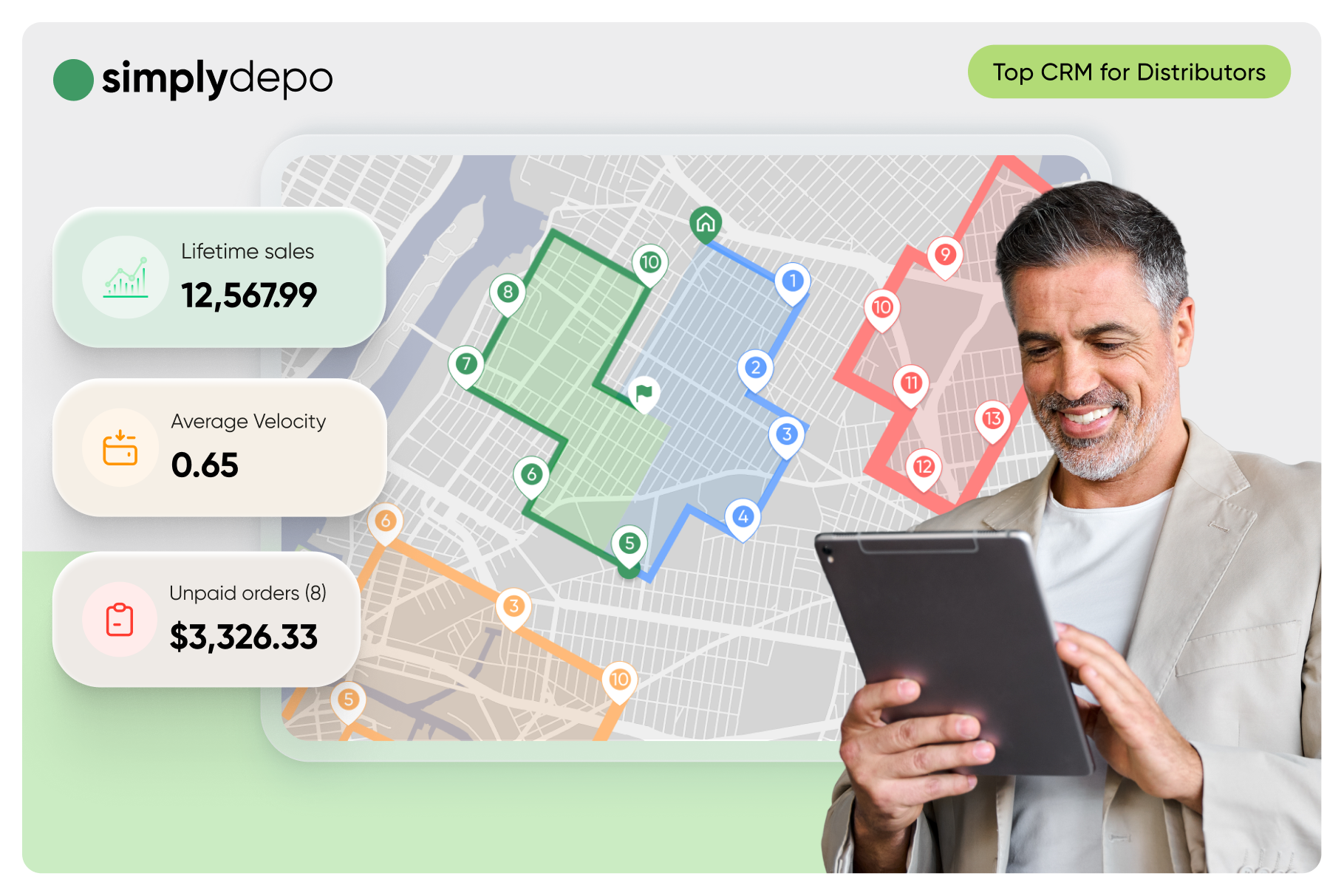Distributors form the backbone of the consumer packaged goods (CPG) and wholesale ecosystem. They buy from manufacturers, manage inventory, and ensure retailers are stocked on time. Yet many still rely on spreadsheets or generic customer relationship management tools that were never designed for route-based operations.
If you’re managing hundreds of SKUs, juggling territory assignments, and keeping track of orders manually, it’s time to rethink your tech stack. The global CRM market is expected to surpass $260 billion by 2032, with distribution and manufacturing among the fastest-growing segments. For distributors, the right CRM doesn’t just centralize data — it becomes the control tower for every sales rep, warehouse team, and delivery route.
This guide breaks down what makes a CRM for distribution companies different, which platforms lead the market, and how SimplyDepo helps modern distributors scale efficiently, stay compliant, and boost margins.
Why CRM Built for Distributors Outperforms Generic CRMs
Generic CRMs like Salesforce or HubSpot are great for desk-based sales cycles but fall short for distributors who live on the road. They often require expensive customization to manage pricing tiers, delivery routes, and product catalogs.
Distribution CRMs are purpose-built for the unique complexity of wholesale and route sales. They combine CRM, ERP, and mobile ordering capabilities to help teams sell smarter, faster, and more profitably.
Top challenges solved by distribution CRMs:
-
Field reps can take orders offline and sync later.
-
Pricing updates push automatically to mobile devices.
-
Managers can track inventory, invoices, and route performance in real time.
-
AI-powered dashboards reveal which accounts are under-serviced or ready for upsell.
💡 Pro Tip
Don’t settle for “customized” generic CRM plugins. They’re costly, fragile, and slow to scale. Choose a CRM that’s designed from the ground up for distribution — one that understands SKUs, routes, and reps out of the box.
Key Features That Drive Efficiency & Growth
When evaluating CRM platforms, distributors should focus on capabilities that directly improve operational efficiency and sales velocity.
| Feature | Benefit | Why It Matters |
|---|---|---|
| Route & Territory Planning | Assign and optimize field routes to minimize travel and fuel costs. | Route optimization directly boosts daily visit counts and order volume. |
| Order & Delivery Management | Track order status, invoices, and returns in one dashboard. | Reduces double entry and missed deliveries. |
| Real-Time Inventory & Pricing | Display current stock, backorders, and promotions. | Ensures accurate quoting and fewer stockouts. |
| Offline Mobile Access | Take orders anywhere — even without Wi-Fi. | Keeps reps productive in warehouses or rural routes. |
| ERP & Accounting Integration | Sync data with systems like QuickBooks, NetSuite, or Epicor. | Eliminates manual reconciliations. |
| Automation & Workflows | Trigger follow-ups, credit checks, or order alerts automatically. | Saves admin time and reduces delays. |
| AI & Analytics | Surface buying patterns and next-best-action insights. | Helps reps focus on high-value customers. |
Legal & Compliance Essentials for Distribution Businesses
Before scaling, every distributor must ensure their legal foundation is solid. The right CRM can help by tracking licenses, tax IDs, and compliance deadlines.
Key steps for U.S. distributors:
-
Register your business — Choose the right structure (LLC, corporation, partnership) for liability protection.
-
Obtain an EIN — Required by the IRS for payroll and banking.
-
Apply for wholesale and resale licenses — Essential for legally purchasing inventory tax-free.
-
Check zoning and warehouse regulations — Local codes restrict where distribution centers can operate.
-
Draft legal agreements — Cover supplier terms, sales contracts, and non-disclosure clauses.
-
Follow employment and safety laws — Comply with OSHA and Fair Labor Standards Act requirements.
-
Protect your IP — Register trademarks and safeguard your brand.
💡 Pro Tip
Use your CRM’s document management features to store licenses, renewal reminders, and compliance notes. It’s a simple way to avoid costly lapses.
Best Practices in Supply Chain & Operations
Top distributors go beyond automation — they build resilient, data-driven supply chains. Insights from Deloitte and NetSuite emphasize agility, integration, and skilled talent as the main differentiators.
Actionable best practices:
-
Develop skilled supply-chain teams. Only ~40 % of leaders feel prepared for modern challenges. Train staff in analytics and digital tools.
-
Align operations with sales. Break silos between warehouse, logistics, and field sales using CRM dashboards.
-
Build supplier partnerships. Share forecasts and KPIs to improve reliability.
-
Diversify sourcing. Use predictive analytics to mitigate disruptions and prevent stockouts.
-
Invest in demand forecasting. Use AI to anticipate seasonality and trends.
-
Adopt real-time visibility. Link CRM, ERP, and logistics data to monitor order flow end-to-end.
Distribution CRM Software Comparison
Choosing the right CRM depends on company size, complexity, and tech readiness. Below is an overview of leading options for distributors and how they stack up against SimplyDepo.
| Platform | Ideal For | G2 Rating | Strengths | Considerations |
|---|---|---|---|---|
| SimplyDepo | SMB and mid-market distributors seeking fast ROI | ⭐ 4.8 | Designed for field reps and operations teams; real-time inventory, mobile offline mode, and ERP integrations. | Newer entrant but hyper-focused on distribution use cases. |
| Proton AI | Enterprise distributors | ⭐ 4.6 | AI-driven insights, strong analytics. | High cost; limited SMB support. |
| Pepperi | CPG & wholesale field sales teams | ⭐ 4.3 | B2B mobile ordering, customizable catalogs. | Complex UI; requires training. |
| Repsly | Merchandising and retail execution | ⭐ 4.2 | Route tracking and photo audits. | Limited ERP integration. |
| Zoho CRM | Small distributors and startups | ⭐ 4.4 | Affordable, broad app marketplace. | Generic CRM requiring heavy customization. |
| Salesforce | Large enterprises | ⭐ 4.4 | Highly flexible, massive ecosystem. | Expensive setup and long deployment cycles. |
✅ SimplyDepo Advantage: Fastest onboarding, no hidden fees, designed specifically for distributors — not retrofitted from generic SaaS.
💡 Pro Tip
Look beyond the sticker price. Many CRMs charge per-module or per-integration — SimplyDepo offers transparent pricing that scales with your business, not your user count.
Case Studies That Prove CRM ROI
GNGR Labs: From Startup to CPG Powerhouse
When GNGR Labs, a wellness beverage brand, began expanding across the East Coast, its growing distributor network struggled with manual orders and delayed communication. After adopting SimplyDepo’s CRM, reps gained mobile access to live inventory, and management could track orders and payments in real time. Within six months, fulfillment errors dropped by 28 % and repeat orders increased by 35 %.
Regional Beverage Distributor: Cutting Waste and Boosting Sales
A mid-Atlantic beverage distributor managing 2,000 SKUs across 12 routes switched from spreadsheets to SimplyDepo’s distribution CRM. Field reps could now place orders offline, while pricing tiers and promotions synced automatically from ERP. Route optimization and automated invoicing reduced administrative time by 20 hours per week, increased order accuracy by 25 %, and improved average order value by 30 %.
How to Choose the Right CRM for Your Distribution Business
Selecting a CRM isn’t just a software decision — it’s a strategy move. Use this framework to evaluate platforms:
-
Define your workflows. List all sales, delivery, and accounting processes.
-
Prioritize essential features. Focus on what drives ROI — mobile access, ERP sync, and route planning.
-
Calculate total cost of ownership. Include setup, support, and training costs.
-
Run scenario-based demos. Ask vendors to show live use cases (returns, pricing updates, offline orders).
-
Pilot first. Start small, gather feedback, then roll out company-wide.
-
Invest in change management. Train reps, celebrate quick wins, and communicate the “why.”
-
Track performance. Use CRM dashboards to monitor adoption, order value, and retention over time.
Why SimplyDepo Makes Sense for Distributors
🚀 SimplyDepo was built for distributors, by distributors. It combines the power of CRM, order management, and route optimization into one seamless platform — no integrations required.
If you’re ready to:
✅ Eliminate spreadsheets and manual reconciliations,
✅ Empower your field reps with mobile ordering, and
✅ Gain real-time visibility into customers, routes, and performance —
then it’s time to see SimplyDepo in action.
👉 Book a demo and discover how leading distributors are scaling faster with SimplyDepo.
Read More
Explore more SimplyDepo resources designed for distributors and field sales teams:
CRM for Distribution Companies FAQs
What is a CRM for distribution companies?
A CRM for distributors is a customer relationship management system built to handle route sales, SKUs, inventory, and delivery workflows. It unifies customer, order, and route data in one place, replacing spreadsheets and general-purpose CRMs that lack distribution-specific features.
How does a distribution CRM differ from a generic CRM?
Generic CRMs track leads and pipelines, while distribution CRMs manage orders, routes, pricing tiers, and inventory. They support offline mobile access, ERP integration, and route optimization—critical for field sales and delivery teams operating across multiple territories.
What benefits does CRM software bring to distributors?
CRM software improves order accuracy, sales visibility, and customer retention. It automates data entry, reduces duplicate work, and helps track margins and routes in real time—resulting in higher revenue and stronger client relationships.
Which features matter most in a distribution CRM?
Key features include route optimization, mobile offline access, SKU-level pricing, ERP integration, automated workflows, and analytics dashboards. These tools make daily sales, delivery, and reporting faster and more accurate.
How does CRM software support legal and regulatory compliance?
A CRM can store licenses, permits, and resale certificates, send renewal reminders, and log compliance documents. Centralizing this data helps distributors stay audit-ready and avoid penalties or missed renewals.
What kind of ROI can distributors expect from CRM adoption?
Research shows CRMs return roughly $8 for every $1 spent. Companies report higher sales productivity, faster quoting, and improved forecasting, while saving hours weekly through automation and centralized data.
How can distributors ensure successful CRM implementation?
Involve field reps early, train continuously, and connect the CRM with ERP, accounting, and inventory systems. Track adoption metrics, celebrate quick wins, and adjust workflows to ensure lasting efficiency gains.
Boost Sales.
Cut Manual Work.
Streamline ordering, routing, and retail execution — while giving every rep the tools to grow accounts faster.
-
+15h
Save weekly
per rep -
93%
Increase
buyer retention -
24%
Increase
in retail sales

Error: Contact form not found.










